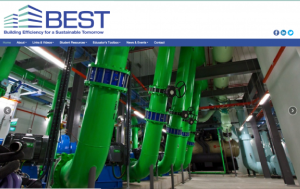Building Efficiency for a Sustainable Tomorrow (BEST) Center

Commercial buildings are a predominant feature of U.S. cities that account for almost 20% of greenhouse gas emissions (GHGs) in the U.S. There is increased pressure in the U.S. to reduce GHG emissions and conserve non-renewable energy resources that is leading to a need to reduce the consumption of energy in commercial buildings. At the same time, research on Leadership in Energy and Environmental Design (LEED) certified buildings suggests that improved indoor environmental quality increases worker productivity. The federal Bureau of Labor Statistics (BLS) estimates that there are 292,000 "HVAC Mechanics and Installers" employed in the U.S. and that the field will add almost 40,000 new positions between 2014 and 2024, a much faster than average rate of growth. A study for the HVACR Workforce Development foundation estimates that 70% of openings in the field are middle skill jobs requiring postsecondary education and that the demand for these workers outstrips supply. To address these issues, it is necessary to educate a workforce of Building Automation Systems (BAS) Specialists as well as High Performance Building Operations Professionals (HPBOP). The Building Efficiency for a Sustainable Tomorrow (BEST) Center will focus on growing its national network of community and technical colleges interested in improving and/or developing new building science technician education programs.
The BEST Center proposes to serve as a national vehicle for the collection, dissemination, and adoption of responsive, timely, and exceptional educational programs, courses, lab applications, and innovative instructional methods for the education of building systems technicians. This project outlines three goals: 1) Transform the instructional capacity of community colleges in the field of building technician education, with an emphasis on HPBOP and BAS training and certification; 2) Engage industry stakeholders and research partners in a national collaboration with community colleges to support high quality building science instructional programs; and, 3) Strengthen the national STEM pipeline for building technicians, focusing on outreach to both high school students and underrepresented adult learners. The Center will continue to archive model curriculum and disseminate and promote adoption of this model curriculum nationwide.
About


Comments